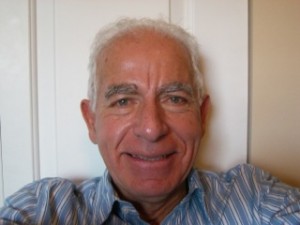Isaac Cohen
Most of my family on my mother’s side left for Israel around the 1950s and we were exchanging news by letters, subjected to Egyptian censorship, that were sent from Israel to Egypt through relatives in England. One day, my father was summoned to the Interior ministry and confronted with one of these letters which was inadvertently sent with the envelope bearing an Israeli stamp. My father did not dispute the fact and asked the Egyptian official whether his old mother-in-law (my grandmother) was an Egyptian enemy. To make a long story short he was released but was well aware that he was black-listed.
My father name was Vita Cohen, my mother’s Rebecca Cohen and my two sisters Lolita Oro and Paula. We used to live in Cairo at 5, Manchiat Al Mahrany.
Following his defeat in the Sinai/Suez campaign of 1956 Nasser decided to take revenge against “his” Jews, and first, against whoever had any contact with Israel, the enemy. My father was one of the first casualties. Since I was in college in Montpellier (France) at the time, I got a very sketchy idea of what happened to my family. Only recently did sister Lolita succeeded, while overcoming her emotions somehow, to add more details to the story of my family.
One evening, in October 1956, while the war was still going on, Egyptian police or army officers came to my father’s pharmacy, Saydlyat Al Shefa, located in Giza, a Cairo suburb, and asked him to come to the police station for questioning. Though my father worked long hours usually, this night he hadn’t arrived and my mother was worried sick. Very late that night big bangs resonated in our front door. My mother opened, and here was my father, totally white and fainting, handcuffed and flanked by police (or army) officers. Lolita screamed at them, how dare they treat my father this way. They slapped her a few times and she fell. My father and mother told her to shut up. The officers wanted to search the house for evidence of activities with the enemy. There was nothing to be found. They ransacked the house, went to Lolita’s desk, and started tearing her schoolbooks, math, science and others. Lolita, who had a strong character (still has…), screamed again, and she was hit repeatedly. My father cried. The last thing he told my mother before he left with his tormentors was “Contact the Consulate!”. Although living in Egypt, we had the Italian nationality and my father was the only one who spoke Italian fluently. My father was born in Asmara, Eritrea, which was an Italian colony at the time, and this is how he got the Italian nationality.
We don’t know a lot about what my father Vita went through. He never wanted to tell. Only a few things such as: he and other fellow Jews were beaten repeatedly, and threatened to be killed; they could only go to a makeshift toilet, a hole in the floor, with the door open, and being humiliated by an Egyptian guard.
Thanks to the efforts of the Italian Consulate, the Egyptians gave two options to the jailed Jews: either getting tried in a court-of-law for contacts with- and/or spying for- Israel, or leave the country without any belongings, apart from one small suitcase of clothes for the whole family. The obvious choice was made.
With my father still in jail, my mother all by herself had to organize everything. She put the contents of the house for sale, and advertising by word of mouth. Furniture and appliances were sold for pennies to Egyptians who took advantage of the situation. Many stole things. Here, Lolita told me of the courageous stand of the doorman, a Sudanese man who took care of the building. He fought with Arabs who were stealing. All that was happening with my sisters Lolita, then 17 years-old, and Paula, then 11 years-old, witnessing the whole tragedy. My mother succeeded in getting 250 Egyptian pounds, the equivalent perhaps of $ 400 today. Since she was not allowed to take any money, she decided to insert the money within the hem of a dress….
The plan, as arranged by the Italian Consulate, was for my mother and sisters to board the ship in Alexandria, and there, after the ship left the Egyptian territorial waters, they would meet my father. My mother then asked the Consul, “and what if he is not there?” He answered: “they promised…”. My mother had no choice. Arriving at the port in Alexandria, they were met by the Egyptian police, carrying whips, who started the “selection” process. They separated Lolita from my mother and Paula for search and asked them to undress. My mother was terrified, as were my sisters. They feared that Lolita was going to be raped. But this did not happen. It was a humiliating body search. Then, they started searching the miserable suitcase, and tearing everything apart. My mother and Lolita were terrified that they might find the hidden money. But my mother apparently did a beautiful sewing job, and they didn’t find anything. The worse was yet to come: they told my mother that she could leave with Paula if she wanted, but Lolita would stay behind as a hostage, since she was at an age close to be recruited by the Israeli Army. It was almost time for the ship to leave, with my father hopefully there, and my mother had to beg and cry and try to convince the Egyptians that they would never go to Israel and that Italy, their country, was where they were going to live. Somehow, she either convinced them or they didn’t really know what to do with Lolita, fearing maybe some international repercussions or whatever… Knowing my mother, I was trying to imagine what she had been going through, almost a “Sophie’s choice” issue. Finally on the ship, and terrorized, they were wondering whether they would finally meet my father, as promised. My parents and sisters could see through a grilled door all the handcuffed prisoners and it took a long time (or so, it seemed at the time) to locate my father who was crying which was extremely unusual for him. Lolita told me “I do not think I ever had seen him crying like that prior to those times!”.
My father left all the family belonging in Egypt, pharmacy, bank accounts, furniture and were expropriated. I estimate roughly the value of the lost property to a minimum of half a million dollars valued as such in 1956.




